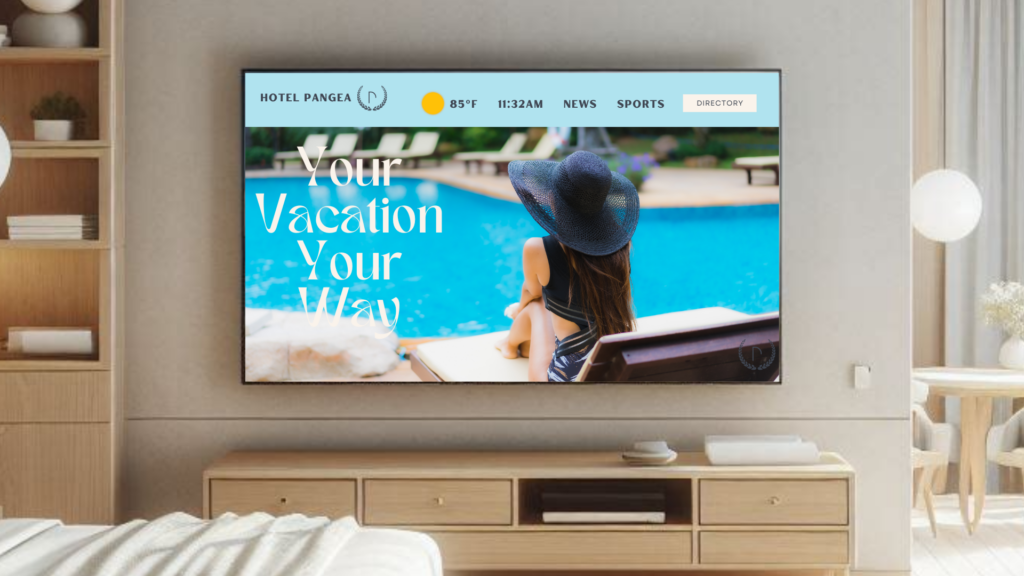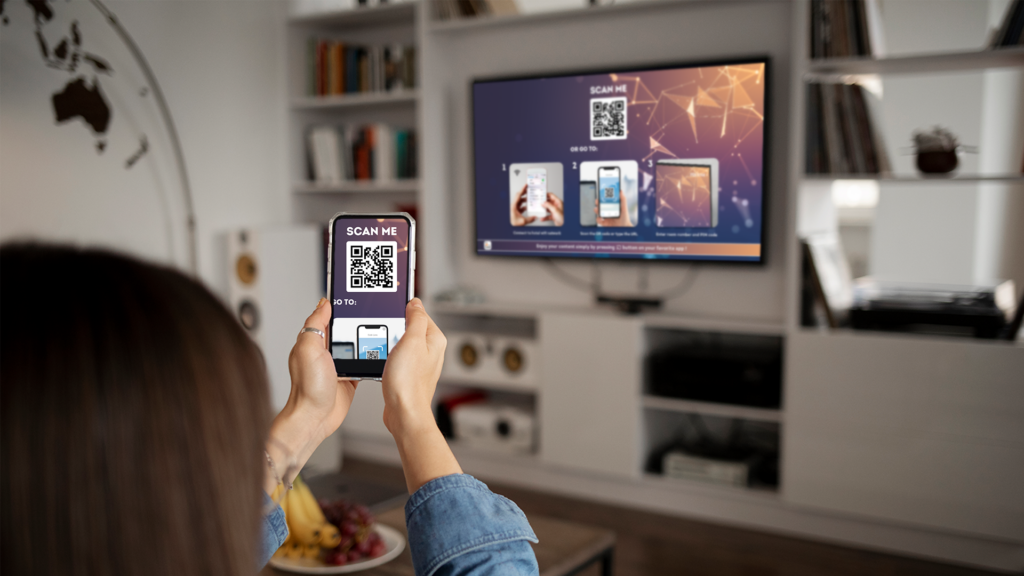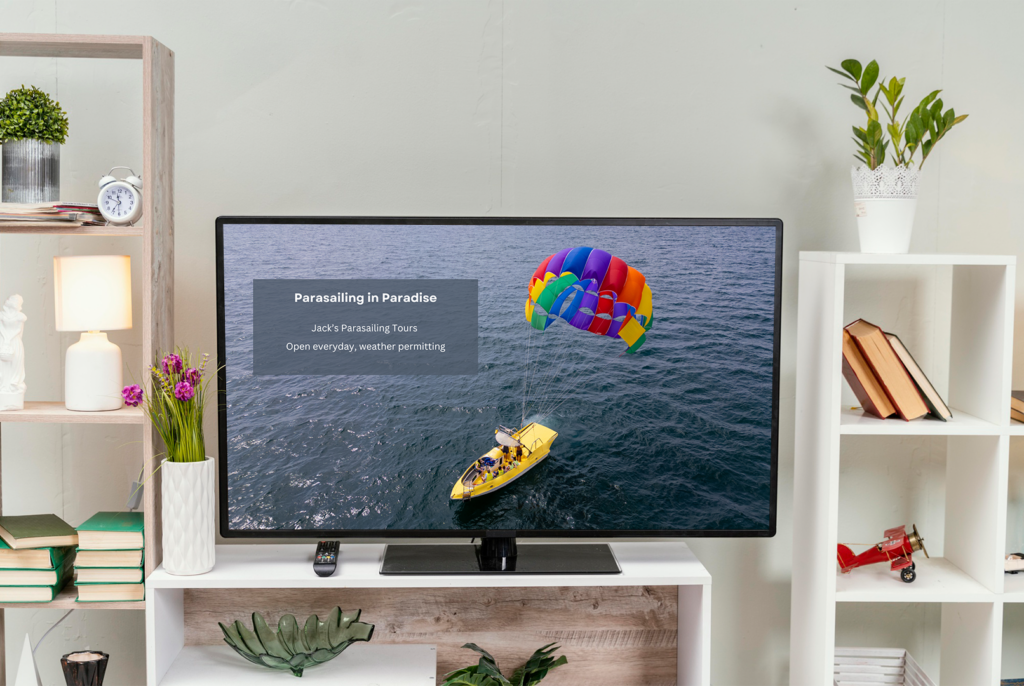โซลูชันทีวีสำหรับโรงแรม: ความแตกต่างระหว่าง IPTV, การแคสต์ และทีวีเคเบิล

ด้วยเทคโนโลยีสมัยใหม่ที่มีอยู่ในปัจจุบัน โรงแรมมีตัวเลือกความบันเทิงภายในห้องให้เลือกหลากหลาย เจ้าของและผู้จัดการโรงแรมจึงต้องตัดสินใจว่าโซลูชันทีวีสำหรับโรงแรมแบบใดเหมาะสมที่สุดสำหรับแขก พวกเขาสามารถเลือกจากทีวีเคเบิลที่ล้าสมัยและมีราคาแพง, IPTV ที่ทันสมัยแต่มีราคาแพง หรือโซลูชันการแคสต์สำหรับโรงแรม
แขกในปัจจุบันคาดหวังประสบการณ์ที่เทียบเท่าหรือดีกว่าที่บ้าน รวมถึงการเข้าถึงบริการสตรีมมิ่ง เนื้อหาที่ปรับให้เป็นส่วนตัว และเมนูแบบโต้ตอบ ผู้ประกอบการโรงแรมต้องตัดสินใจครั้งสำคัญเมื่อเลือกใช้ระหว่าง IPTV, การแคสต์ และเคเบิลทีวีแบบดั้งเดิม โดยการเลือกที่ถูกต้องสามารถยกระดับความพึงพอใจของแขกได้อย่างมาก และเพิ่มประสิทธิภาพการดำเนินงานในระยะยาว
ในบทความนี้ เราจะสำรวจโซลูชันทีวีทั้งสามแบบสำหรับโรงแรม เปรียบเทียบข้อดีและข้อจำกัดของแต่ละแบบ และช่วยโรงแรมกำหนดว่าการเลือกแบบใดสอดคล้องกับเป้าหมายด้านประสบการณ์ของแขกมากที่สุด
โซลูชันทีวีสำหรับโรงแรมมีแบบใดบ้าง?
ก่อนที่จะเข้าสู่การเปรียบเทียบ สิ่งสำคัญคือต้องนิยามก่อนว่าโซลูชันทีวีสำหรับโรงแรมหมายถึงอะไร โซลูชันทีวีสำหรับโรงแรมหมายถึงเทคโนโลยีและระบบที่ใช้ในการส่งมอบเนื้อหาทีวีและมัลติมีเดียไปยังห้องพักของแขก โดยทั่วไปแล้วโซลูชันเหล่านี้จะแบ่งออกเป็นสามประเภทหลัก:
- เคเบิลทีวี
- IPTV (โทรทัศน์ผ่านโพรโทคอลอินเทอร์เน็ต)
- การแคสต์ (การสตรีมของแขก หรือการแชร์หน้าจอ)
ตัวเลือกแต่ละแบบมีคุณสมบัติและข้อแลกเปลี่ยนของตัวเอง มาลองแยกวิเคราะห์กัน
เคเบิลทีวีแบบดั้งเดิม

เคเบิลทีวีเป็นโซลูชันทีวีมาตรฐานของโรงแรมมาเป็นเวลานาน ผ่านการกระจายสัญญาณด้วยสายโคแอกเชียล โรงแรมสามารถให้บริการช่องรายการปกติและช่องพรีเมียมได้ เคเบิลทีวีต้องใช้เครื่องรับสัญญาณหรือกล่องเซ็ตท็อปในแต่ละห้อง ซึ่งเชื่อมต่อกับบริการหลักของโรงแรม
ประโยชน์ของเคเบิลทีวีในโรงแรม:
- เชื่อถือได้และคุ้นเคย – แขกส่วนใหญ่รู้วิธีใช้เคเบิลทีวีและชื่นชอบการมีช่องโปรดของตนเอง
- การติดตั้งที่มีต้นทุนต่ำ – โรงแรมเก่าหลายแห่งมีโครงสร้างพื้นฐานสายโคแอกเชียลอยู่แล้ว
- ไม่จำเป็นต้องใช้แบนด์วิดท์อินเทอร์เน็ต – เคเบิลทีวีทำงานแยกจากเครือข่ายของโรงแรม ลดการใช้งานของ Wi-Fi
ข้อจำกัดของเคเบิลทีวีในโรงแรม:
- การปรับให้เป็นส่วนตัวมีจำกัด – แขกไม่สามารถเข้าสู่ระบบบัญชีสตรีมมิ่งของตนเองได้
- เนื้อหาแบบตายตัว – เคเบิลทีวีไม่มีการเข้าถึงแบบออนดีมานด์และไม่มีเมนูแบบโต้ตอบ
- การมีส่วนร่วมน้อยลง – นักเดินทางรุ่นใหม่ชอบการสตรีมและบริการ OTT มากขึ้นเรื่อย ๆ ทำให้เคเบิลทีวีดูตกยุค
- การมีส่วนร่วมน้อยลง – นักเดินทางรุ่นใหม่ชอบการสตรีมและบริการ OTT มากขึ้นเรื่อย ๆ ทำให้เคเบิลทีวีดูตกยุค
แม้ว่าทีวีเคเบิลยังคงมีบทบาทในโรงแรมบางแห่ง แต่หลายโรงแรมกำลังอัปเกรดไปใช้โซลูชันทีวีที่ทันสมัยกว่า เช่น IPTV หรือการแคสต์
IPTV (โทรทัศน์ผ่านโพรโทคอลอินเทอร์เน็ต)

IPTV ส่งมอบเนื้อหาทีวีและมัลติมีเดียผ่านเครือข่าย IP ของโรงแรม แทนที่จะใช้สายโคแอกเชียล IPTV ใช้การเชื่อมต่อแบบอีเธอร์เน็ตเพื่อส่งทั้งช่องรายการสดและเนื้อหาแบบออนดีมานด์ผ่านระบบหัวจ่ายแบบศูนย์กลาง โซลูชัน IPTV สำหรับโรงแรมส่วนใหญ่อนุญาตให้โรงแรมผสานบริการต่าง ๆ เช่น คู่มือรายการแบบอินเทอร์แอกทีฟ วิดีโอตามสั่ง (VoD) และพอร์ทัลสำหรับแขกที่มีแบรนด์โรงแรม
ประโยชน์ของ IPTV สำหรับโรงแรม:
- ประสบการณ์แบบอินเทอร์แอกทีฟสำหรับแขก – IPTV ช่วยให้สามารถแสดงหน้าจอต้อนรับ โปรโมชั่นของโรงแรม การสั่งรูมเซอร์วิส และข้อมูลท้องถิ่นได้โดยตรงบนทีวี
- เนื้อหาแบบออนดีมานด์ – แขกสามารถเข้าถึงภาพยนตร์และซีรีส์ทีวีได้ตลอดเวลา
- การสร้างแบรนด์และการปรับให้เป็นส่วนตัว – ส่วนติดต่อผู้ใช้สามารถปรับแต่งให้แสดงแบรนด์ของโรงแรมและแม้แต่ข้อความที่ปรับให้เหมาะกับแขกแต่ละคนได้
- การจัดการแบบศูนย์กลาง – สามารถส่งการอัปเดตจากระยะไกลไปยังทุกห้องได้ เนื่องจากทีวีทั้งหมดเชื่อมต่อกับเครือข่าย IP เดียวกัน
ข้อจำกัดของ IPTV สำหรับโรงแรม:
- ต้องการแบนด์วิดท์ที่สูงขึ้น – IPTV ต้องการเครือข่ายข้อมูลที่มีประสิทธิภาพเพื่อสตรีมเนื้อหาไปยังแต่ละห้อง
- การลงทุนล่วงหน้า – โรงแรมอาจต้องอัปเกรดโครงสร้างพื้นฐานที่มีอยู่เป็นระบบอีเธอร์เน็ต ซึ่งอาจมีค่าใช้จ่ายสูงในอาคารเก่า
- การผูกขาดผู้ให้บริการ – ระบบ IPTV จำนวนมากเป็นแบบปิด ทำให้โรงแรมต้องผูกติดกับผู้ให้บริการหรือแพลตฟอร์มเพียงรายเดียว
- ค่าบอกรับสมาชิกสูง – เนื่องจากมีความสามารถในการโต้ตอบและการปรับแต่งสูง IPTV จึงมีราคาที่ค่อนข้างแพง เหมาะสมกับโรงแรมและรีสอร์ทระดับ 4 และ 5 ดาวเป็นหลัก
แม้จะมีความท้าทายเหล่านี้ IPTV ก็ยังโดดเด่นในฐานะหนึ่งในโซลูชันทีวีสำหรับโรงแรมที่ทรงพลังที่สุด เพราะช่วยให้สามารถควบคุมสภาพแวดล้อมดิจิทัลภายในห้องได้อย่างสมบูรณ์ IPTV จึงเป็นตัวเลือกที่เหมาะสมที่สุดสำหรับรีสอร์ทและโรงแรมระดับไฮเอนด์
โซลูชันการแคสต์

การแคสต์ได้กลายเป็นหนึ่งในโซลูชันทีวีสำหรับโรงแรมที่เติบโตเร็วที่สุด เพราะมอบประสบการณ์แบบเดียวกับที่แขกคุ้นเคยที่บ้าน แทนที่จะต้องเลือกเนื้อหาที่โรงแรมจัดให้ แขกสามารถสตรีมจากบัญชีสมาชิกของตัวเองโดย “แคสต์” จากโทรศัพท์มือถือหรือแล็ปท็อปไปยังทีวีในห้องพัก โซลูชันการแคสต์สำหรับโรงแรมส่วนใหญ่ใช้เครื่องมือที่เข้ากันได้ เช่น Google Chromecast หรือ Apple TV พร้อมระบบยืนยันตัวตนของแขกที่ปลอดภัย
ประโยชน์ของการแคสต์สำหรับโรงแรม:
- นำเนื้อหาของคุณมาเอง – แขกใช้บัญชี Netflix, Hulu, YouTube หรือบัญชีอื่นของตนเอง
- ประสบการณ์ผู้ใช้ที่เรียบง่าย – แขกไม่จำเป็นต้องเข้าสู่ระบบบนทีวี เพียงแค่แคสต์จากอุปกรณ์ของตนเอง
- ลดต้นทุนการขอสิทธิ์เนื้อหา – โรงแรมไม่จำเป็นต้องขอสิทธิ์หรือใบอนุญาต VoD
- ความพึงพอใจของแขกสูง – แขกจะได้รับประสบการณ์ที่ราบรื่นและคุ้นเคยโดยไม่ต้องเรียนรู้แพลตฟอร์มใหม่
- การปรับแต่งและการทำให้เป็นส่วนตัว – โรงแรมสามารถแสดงสไลด์โชว์และวิดีโอที่กำหนดเองได้เช่นเดียวกับที่ทำกับ IPTV
ข้อจำกัดของการแคสต์สำหรับโรงแรม:
- การพึ่งพาอุปกรณ์ส่วนตัว – หากแขกไม่มีสมาร์ตโฟนหรือบัญชีสมัครสมาชิก การแคสต์จะมีคุณค่าน้อยลง
- ความต้องการแบนด์วิดท์ – การแคสต์ต้องการ Wi-Fi ความเร็วสูงในทุกห้อง มิฉะนั้นคุณภาพการสตรีมจะลดลง
- การโต้ตอบน้อยกว่า – เมื่อเทียบกับ IPTV การแคสต์มีการโต้ตอบน้อยกว่า เช่น ไม่มีบริการรูมเซอร์วิส การเช็กเอาต์ หรือการควบคุมอุณหภูมิผ่านทีวีของแขก
การแคสต์เหมาะอย่างยิ่งสำหรับโรงแรมที่มีเครือข่ายไร้สายที่แข็งแกร่งและลูกค้าที่คุ้นเคยกับเทคโนโลยี โดยเฉพาะอย่างยิ่งสำหรับโรงแรมบูทีค โรงแรมที่พักระยะยาว และแบรนด์ที่มุ่งเป้ากลุ่มลูกค้ารุ่นใหม่
สิ่งที่ต้องพิจารณาเมื่อต้องเลือกใช้ระหว่าง IPTV, การแคสต์ และเคเบิลทีวี
เนื่องจากโซลูชันทีวีสำหรับโรงแรมแตกต่างกันทั้งด้านฟังก์ชันการทำงานและการลงทุน โรงแรมจึงควรพิจารณาปัจจัยต่อไปนี้อย่างรอบคอบ:
เกณฑ์ | เคเบิลทีวี | การแคสต์ | ไอพีทีวี |
|---|---|---|---|
การปรับให้เหมาะกับแขกเป็นรายบุคคล | ต่ำ | ปานกลาง | สูง |
ข้อกำหนดด้านโครงสร้างพื้นฐาน | ต่ำ | ปานกลาง | สูง |
ต้นทุนการติดตั้ง | ต่ำ | ปานกลาง | สูง |
ค่าบอกรับสมาชิกแบบต่อเนื่อง | สูง | ต่ำ | สูง |
โปรโมตบริการของโรงแรม | ต่ำ | สูง | สูง |
ตัวเลือกความบันเทิง | ต่ำ | สูง | สูง |
ความคุ้นเคยของแขก | สูง | ปานกลาง | ต่ำ |
การผสมผสานหลายโซลูชันทีวีสำหรับโรงแรม
โรงแรมสมัยใหม่หลายแห่งกำลังนำโมเดลแบบผสมมาใช้ ตัวอย่างเช่น:
- ประหยัดงบประมาณ: เคเบิลทีวี + การแคสต์ – คงช่องรายการสดไว้ พร้อมมอบประสบการณ์ “คล้าย IPTV” ที่ปรับให้เหมาะกับแขกแต่ละคน ด้วยสไลด์โชว์และวิดีโอแบบกำหนดเอง รวมถึงการเข้าถึงแอปสตรีมมิ่งที่ชื่นชอบ ตัวเลือกนี้ตอบโจทย์ทั้งแขกรุ่นใหม่ แขกรุ่นเก่า และเจ้าของโรงแรม ด้วยความคุ้มค่าและราคาย่อมเยา
- ประสบการณ์เต็มรูปแบบ: IPTV + การแคสต์ – นำเสนอเนื้อหาพิเศษที่มีแบรนด์ของโรงแรมและคุณสมบัติแบบโต้ตอบเต็มรูปแบบผ่าน IPTV รวมถึงการสั่งรูมเซอร์วิส การควบคุมอุณหภูมิ การเช็กเอาต์ระยะไกล และอื่น ๆ อีกมากมาย นอกจากนี้ ยังอนุญาตให้แขกแคสต์บริการสตรีมของตนเองหรือเข้าถึงบริการและช่องแบบจ่ายต่อการรับชมผ่าน IP
ด้วยการผสมผสานโซลูชันทีวีสำหรับโรงแรม ผู้ประกอบการโรงแรมสามารถรองรับความชื่นชอบที่หลากหลายของแขก และใช้ประโยชน์จากโครงสร้างพื้นฐานที่มีอยู่ให้เต็มประสิทธิภาพ
สรุป: โซลูชันทีวีสำหรับโรงแรมแบบใดที่เหมาะกับคุณ

ท้ายที่สุดแล้ว โซลูชันทีวีสำหรับโรงแรมที่ดีที่สุดขึ้นอยู่กับเป้าหมายของโรงแรม โครงสร้างพื้นฐาน และกลุ่มลูกค้า เคเบิลทีวียังคงเป็นตัวเลือกที่คุ้มค่าในกรณีที่ไม่สามารถปรับปรุงระบบได้ในทันที IPTV มอบการสร้างแบรนด์ที่ลึกซึ้ง การโต้ตอบ และโอกาสสร้างรายได้ใหม่ ๆ ในขณะที่การแคสต์มอบประสบการณ์การสตรีมแบบเหมือนอยู่บ้านที่นักเดินทางยุคใหม่ชื่นชอบ
ผู้ประกอบการโรงแรมที่มีวิสัยทัศน์ให้ความสำคัญกับความยืดหยุ่น โดยลงทุนในโซลูชันที่ให้สิ่งที่ดีที่สุดจากทุกทางเลือก ด้วยการผสมผสาน IPTV การแคสต์ และเคเบิลอย่างเหมาะสม โรงแรมสามารถยกระดับประสบการณ์ของแขก สร้างความภักดี และรักษาความได้เปรียบในตลาดที่มีการแข่งขันสูงขึ้นเรื่อย ๆ
